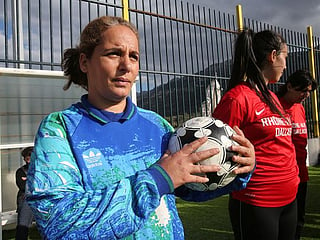Algerians vote in local polls to seal post-Bouteflika ‘change’
Despite appeals vote for municipal and provincial councils sparks little public interest

Algiers: Algerians began voting on Saturday in local elections seen as key in President Abdul Madjid Tebboune’s push to turn the page on the two-decade rule of late president Abdul Aziz Bouteflika.
But despite official campaigns urging Algerians to “make their mark”, the vote for municipal and provincial councils has sparked little public interest.
The election is the third vote in Algeria under Tebboune, who has vowed to reform state institutions inherited from Bouteflika, an autocrat who ruled the country for two decades.
Observers are predicting a low turnout, as with the poorly attended elections since Bouteflika was driven from power by the Hirak pro-democracy protest movement in April 2019.
The North African country’s rulers are trying to “impose their will despite the embarrassing results of previous elections”, said analyst Mohammad Hennad.
Polling stations opened at 8am (0700 GMT) and are scheduled to close at 7pm.
More than 23 million people are eligible to vote, with 15,230 candidates standing and results expected on Sunday.
Campaigning had been muted despite calls by authorities on Algerians to take part if they “want change” and “institution building”.
Tebboune was elected in a contentious, widely boycotted 2019 ballot months after Bouteflika stepped down under pressure from the army and Hirak rallies.
He has vowed to break with local and regional elections marred by widespread claims of fraud in the era of Bouteflika, who died in September at the age of 84.
In a televised interview on Friday, Tebboune, a former prime minister under the late autocrat, called on Algerians to participate actively in the vote.
“If the people want change it is time they do something about it themselves by voting,” he said.
‘Huge challenges’
Algeria’s local assemblies elect two-thirds of members of the national parliament’s upper house, with the president appointing the remainder.
Redouane Boudjemaa, a journalism professor at the University of Algiers, said the vote was simply “an attempt to clean up the facade of local councils by changing their members, to benefit the ruling class”.
“Politics at the moment is limited to slogans proclaiming that the country has entered a new era, while all indicators point to the contrary.”
Tebboune’s rule has seen a crackdown on journalists and Hirak activists, even as he has packaged major policy moves as responses to the calls by the protest movement for reform.
He has also faced a diplomatic crisis with Algeria’s colonial ruler France and is embroiled in a diplomatic crisis with neighbouring Morocco, with which Algiers severed diplomatic ties in August over the disputed territory of Western Sahara.
But in his televised remarks on Friday, Tebboune said that “these relations must return to normal provided the other party (France) conceives them on an equal basis, without provocation”.
The analyst Hennad said the elite in power since Algeria’s independence from France in 1962, was using slogans around change to impose its agenda, without truly engaging other political forces.
Tebboune pushed through an amended constitution in November 2020, approved by less than 24 percent of the electorate, and oversaw a parliamentary election that saw just 23 percent of voters take part.
Despite a declared boycott by the opposition Rally for Culture and Democracy (RCD), party activists are standing on independent lists, setting up a showdown with the rival Front of Socialist Forces (FFS) in the Kabylie region that often sees significant abstentions.
Electoral board head Mohamed Charfi has stressed the body’s efforts to boost turnout.
But Boudjemaa said the main issue at stake was the “huge economic and social challenges of the coming year”, warning that Algerian’s purchasing power could “collapse”.
“Several indicators show that the pouvoir (ruling elite) has neither the vision nor the strategy to respond to the crisis,” he said.
Sign up for the Daily Briefing
Get the latest news and updates straight to your inbox





